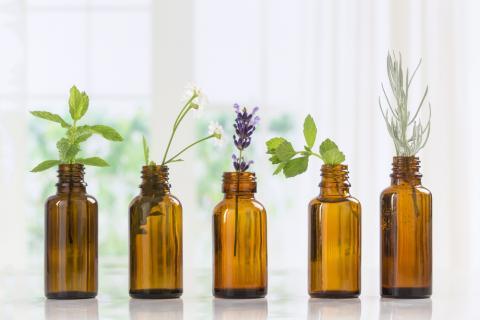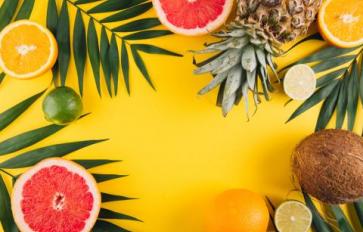
Lemons are amazing. What other fruit possesses the power to add an unmatchable zing to a variety of dishes ranging from salad dressing to fish to cake; cleans pots and pans; and also alleviates the symptoms of a common cold? I composed this love letter to lemons when I found myself in a hotel room on the other side of the country, nearly defeated by a sinus cold. Instead of asking room service for a lemon with God-knows-what pesticides on it, I did something I’d never done before: I placed a few drops of lemon essential oil in spring water and drank. Instantly uplifted by bright flavor, I was transported out of that stuffy hotel room to a long ago time when I walked under extravagant trellised lemon trees near the seaside in Sorrento. For a moment I could taste salty air tinged with lemon blossoms. Then my thoughts were: Lemon essential oil, where have you been all of my life, and what other amazing powers do you have? Whole, fresh fruit is a hard act to follow, but lemon essential oil is wonderful in that it’s kind of like having a bunch of lemons in my handbag ready to enjoy anytime I’d like. To learn more about it and the magic of essential oils, I turned to essential oil educator Samantha Lee Wright, host of The Essential Oil Revolution, the top rated podcast on the subject.
So, Just What Are Essential Oils?
“Essential oils are concentrated, volatile extracts from trees and the petals, flowers, rinds, grasses, leaves, and roots of plants,” explained Wright. Although most of us don’t realize it, essential oils have long been used in the concoctions created by the food, cosmetics, and medical industries. Essential oils are incredibly versatile and can be used in home for personal care, cleaning, physical and emotional wellbeing, nutritional support, and cooking. Yes, cooking!
Why Should I Eat Essential Oils?
In addition to imparting great flavor, Wright said health benefits, convenience, and economy are some of the reasons she loves cooking with essential oils. We’re just beginning to understand their nutritional value. They contain vitamins, nutrients, and trace elements. Studies indicate many of them boast an extraordinary level of antioxidants, some aid digestion, and they all seem to have some psychological effect on us. They’re biochemically harmonic with the human body, which means they enter and leave it with great efficiency, leaving no toxins behind, unlike many other flavor enhancers and mood stimulants. All of this comes in a tiny bottle with a long shelf life that transports easily and can be enjoyed year round, even when its fresh counterparts are out of season. And although the best essential oils might seem pricey, their intense concentration makes them less expensive than using fresh herbs, flowers, and fruit.
Which Essential Oils Should I Eat?
Essential oils for culinary use fall into four categories: herbs, spices, citrus, and flowers. Some of Wright’s favorites include peppermint (for brownies), orange (for waffles and smoothies), and black pepper (on roasted vegetables). Another favorite is lemongrass. “It seems like I’m putting it in everything right now,” she said. “It’s great in soup, rice, and chicken tikka masala.”
Since essential oils are volatile and highly concentrated, handle them mindfully. Good cooking is all about balance; essential oils should enhance a dish, not overpower it. Start with one drop, taste and adjust in small increments. Flavor and aroma can vary based on brand and even in different batches, so experimentation through tasting is key. Also, introducing an oil to a food after you’ve removed it from its heat source is best; high heat diminishes an essential oil’s nutritional properties. And of course, use only pure, organic essential oils from a source that you trust. The choice to ingest essential oils remains a controversial topic that hinges on quality and purity. Supporting companies that manufacture quality products is good for your health and encourages further research into nature’s fragrant apothecary.
I, like many of us, am fascinated by medicinal plants and foods. Maybe it’s intuitive, or written into our genetics. After all, in the not too distant past, nature was our pharmacy. Whatever the reasons, I developed quite an affection for Wright’s lemon peppermint water recipe, which I’m including below. It’s incredibly refreshing, and each time I drink it, I’m reminded that when life gives you lemons, you can always brighten things up with a few drops of lemon essential oil.
Samantha Lee Wright's Essential Lemon Peppermint Water
Note: Peppermint is adaptogenic; it will stimulate or relax the body in order to bring it into homeostasis, or balance. The following drink is alkalizing and can be sipped throughout the day. It will also encourage oxygen delivery, so it’s great before exercise.
Ingredients
½ gallon spring water
2 drops each of peppermint and lemon oils
1 Tablespoon pure unheated honey
Directions
Mix all ingredients in a glass or other nonreactive container. (Mix well; the honey will help the oil disperse through the water.)
Samantha Lee Wright is the host of The Essential Oil Revolution. Each week she interviews the world's top experts about essential oils, sharing hundreds of recipes and different ways to use them. Her favorite guests have included chefs, food experts, and oil inspired restaurant owners. The Essential Oil Revolution is freely available on iTunes and Stitcher.
Photo Credit: Shiraz Leyva








